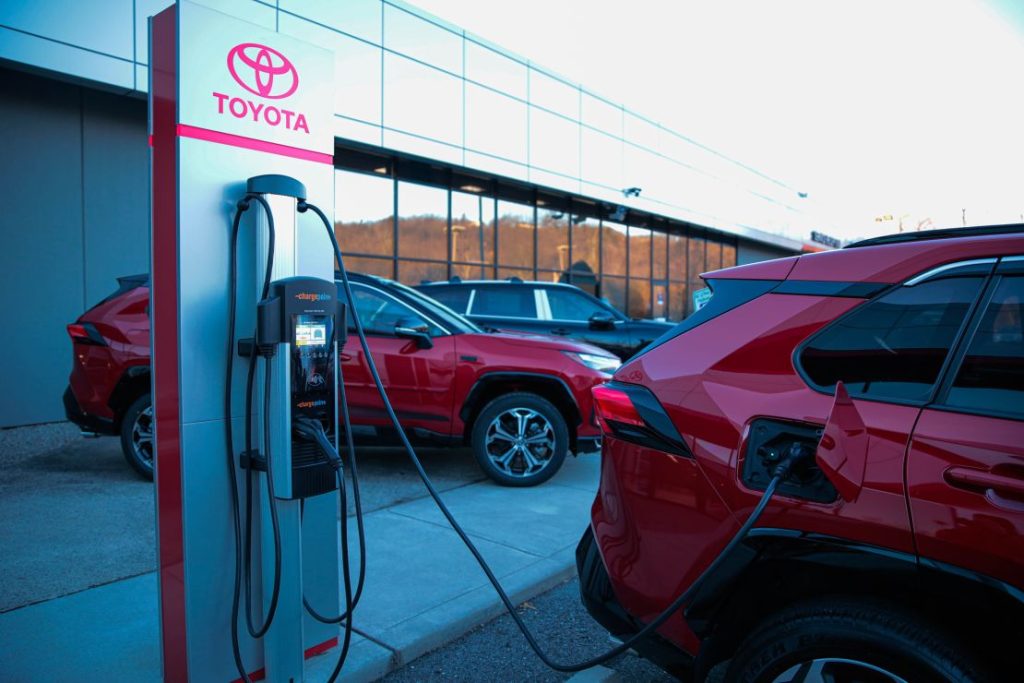Toyota Postpones U.S. Electric Vehicle Plans Amid Slowing Demand
3 min read

Toyota has announced a delay in its plans to begin electric vehicle (EV) manufacturing in the United States, responding to a decline in global demand for battery-powered cars. Originally targeting late 2025 or early 2026 for the launch of its U.S. EV operations, the Japanese automotive giant now expects to begin production at an unspecified time in 2026, according to a company spokesperson who spoke with BBC News.
This announcement reflects a broader trend in the automotive industry, where several major manufacturers, including Volvo and Ford, have recently reassessed their electric vehicle strategies. Despite these setbacks, Toyota remains committed to its global goal of producing 1.5 million battery electric vehicles (BEVs) by 2026. Company spokesperson Scott Vazin emphasized that in the next two years, Toyota plans to introduce “5 to 7 battery electric vehicles in the U.S. market.”
In line with its commitment to electrification, earlier this year, Toyota revealed a significant investment of $1.3 billion (£980 million) in its Kentucky factory. This investment is part of a broader strategy to manufacture a three-row electric sport utility vehicle (SUV) at that location. Additionally, plans are underway to produce another electric model at a plant in Indiana.
To support these initiatives, Toyota is increasing its production capacity for lithium-ion batteries. A new battery manufacturing facility in North Carolina is expected to become operational next year, further bolstering the company’s EV ambitions.
Toyota’s decision to delay its U.S. EV plans comes as the global automotive sector grapples with diminishing demand for electric vehicles in key markets. On a recent note, Tesla’s quarterly figures fell short of Wall Street’s expectations, raising concerns that the leading EV manufacturer might experience its first annual decline in deliveries.
The challenges facing Toyota are not isolated. Last month, Volvo revised its ambitions, abandoning its target to produce exclusively fully electric vehicles by 2030. The company announced it would now offer hybrid vehicles as part of its product lineup, citing shifting market conditions as the rationale for this significant change in strategy, which was initially laid out just three years ago.
Similarly, Ford has also made headlines by adjusting its electric vehicle strategy. The automaker recently decided to scrap plans for a large, three-row, all-electric SUV and has postponed the launch of its next electric pickup truck. Chief Financial Officer John Lawler highlighted that these adjustments were necessary due to “pricing and margin compression” affecting the EV market.
These developments illustrate a growing hesitance within the automotive industry as manufacturers reassess their positions in a rapidly evolving market. While consumer interest in electric vehicles remains strong, external factors such as economic uncertainty, supply chain issues, and fluctuating material costs are influencing production decisions and timelines.
Toyota’s cautious approach mirrors the current climate in the automotive industry, where many companies are recognizing the need for adaptability in their EV strategies. As the market landscape shifts, manufacturers are weighing the balance between ambitious targets and the realities of consumer demand.
In this context, Toyota’s decision to postpone its U.S. electric vehicle production aligns with a broader trend of reassessment among automotive companies. While the company remains focused on its long-term electrification goals, the delay signals an understanding of the complexities involved in launching new technologies in a competitive market.
As the automotive sector continues to navigate these challenges, the future of electric vehicle production remains uncertain. For Toyota and its competitors, staying responsive to market demands while pushing forward with innovation will be crucial for success in the evolving landscape of electric mobility.